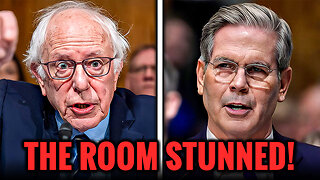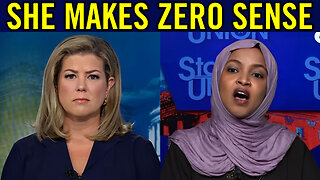Premium Only Content

36 Yogananda St SANDY HOOK FBI EVIDENCE
The above-captioned matter was heard as a contested case on June 3, 2013, at which time the complainants and the respondents appeared and presented testimony, exhibits and argument on the complaint. Pursuant to §1-21j-27 of the Regulations of Connecticut State Agencies, the motion of the state’s attorney to intervene in the matter as a full party respondent was granted at the hearing without objection from the other parties. The case caption has been amended accordingly.
After consideration of the entire record, the following facts are found and conclusions of law are reached:
1. The respondent chief and the respondent police department (“Newtown respondents”) are public agencies, within the meaning of §1-200(1), G.S.
2. It is found that, by letter dated December 14, 2012, the complainants requested, from the Newtown respondents, access to and copies of:
(a) all police calls for service to 36 Yogananda Street (from January 1998 to the present) and to Sandy Hook Elementary School in Newtown (from January 2002 to the present);
(b) all 911 calls originating from 36 Yogananda Street (from Janaury 1998 to the present) and from Sandy Hook Elementary School (from January 2002 to the present);
(c) all police reports in which Adam Lanza (DOB 4/22/92), Ryan Lanza (DOB 4/88), Nancy Lanza (DOB 9/60), or Peter Lanza (DOB 11/58) are mentioned. This includes, but is not limited to, if the above names were a suspect or person of interest.
3. It is found that, by letter dated December 15, 2012, the complainants requested that the Newtown respondents provide any responsive records as they become available, rather than all at once, citing an “urgent need to inform the public about their safety.”
4. It is found that, on January 14, 2013, and again on January 15, 2013, the complainants inquired by phone as to the status of the records request, described in paragraph 2, above, and reiterated such request.1
1
In a Notice of Order, dated July 23, 2013, the hearing officer raised a jurisdictional question and ordered the complainants to provide evidence that the complaint in this matter was timely filed. By letter dated August 7, 2013, the complainants provided the hearing officer with an affidavit of the complainant Jack Gillum, which has been marked as complainants' exhibit 6 (after-filed). Thereafter, the hearing officer ordered the respondents, by Notice dated August 9, 2013, to submit any comment, reply or contest regarding the affidavit by August 19, 2013. By letter dated August 8, 2013, the Newtown respondents objected to the Commission's jurisdiction over the complaint in this matter. Such letter has been marked as respondents' exhibit C (after-filed). The state's attorney filed no response.
5. By letter of complaint, dated and filed January 23, 2013, the complainants appealed to this Commission, alleging that the Newtown respondents violated the Freedom of Information (FOI) Act by failing to comply with the request for records described in paragraph 2, above.
6. It is found that, by email dated February 14, 2013, the respondent state’s attorney informed counsel for the Newtown respondents that his office was in charge of the ongoing criminal investigation into the December 14th shootings at Sandy Hook Elementary School and 36 Yogananda Street, and that “materials related to this investigation such as 911 calls are not subject to a Freedom of Information Act request.” The respondent state’s attorney further instructed counsel not to release any materials “at this time.”
7. It is found that, by letter dated February 22, 2013, counsel for the Newtown respondents denied the request, described in paragraph 2, above, stating that “[p]roduction of responsive documents is currently prohibited under C.G.S. §1-210(b)(3)(C) as information to be used in a prospective law enforcement action.”
8. Preliminarily, with regard to the issue of subject matter jurisdiction, it is found, based upon the findings in paragraph 4, above, that the complaint in this matter was timely filed. Accordingly, it is concluded that this Commission has jurisdiction to decide this case.
9. Section 1-200(5), G.S., provides:
“Public records or files” means any recorded data or information relating to the conduct of the public’s business prepared, owned, used, received or retained by a public agency, or to which a public agency is entitled to receive a copy by law or contract under section 1-218, whether such data or information be handwritten, typed, tape-recorded, printed, photostated, photographed or recorded by any other method.
10. Section 1-210(a), G.S., provides in relevant part that:
Except as otherwise provided by any federal law or state statute, all records maintained or kept on file by any public agency, whether or not such records are required by any law or by any rule or regulation, shall be public records and every person shall have the right to (1) inspect such records promptly during regular office or business hours . . . (3) receive a copy of such records in accordance with section 1-212.
11. Section 1-212(a), G.S., provides in relevant part that “[a]ny person applying in writing shall receive, promptly upon request, a plain, facsimile, electronic or certified copy of any public record.”
12. It is found that the records described in paragraph 2, above, are public records within the meaning of §§1-200(5), 1-210(a) and 1-212(a), G.S.
13. It is found that the Newtown respondents relied on the directive from the state’s attorney, described in paragraph 6, above, as the basis for withholding all records responsive to the request, described in paragraph 2, above. It is also found that the Newtown respondents did not conduct a search for such records until May 31, 2013.
14. It is found that the search, described in paragraph 13, above, revealed that the Newtown respondents maintain records of three police calls for service to 36 Yogananda Street—one in 2003, one in 2006 and one in 2012; and “over 100 calls” for service to Sandy Hook Elementary School, between January 2002 and the date of the request, for incidents such as animal nuisance, suspicious persons, and burglar alarms. It is also found that such records, consisting of incident reports identified through the Newtown respondents’ CAD (computer aided dispatch) system, are responsive to the request, described in paragraph 2(a), above, and that none of these records were provided to the complainants as of the date of the hearing in this matter. None of the respondents claimed any exemption from disclosure for these records.
15. With respect to the request described in paragraph 2(c) above, it is found that the Newtown respondents do not maintain any records responsive to such request.
16. With respect to the request described in paragraph 2(b), above, it is found that the search, described in paragraph 13, above, revealed the Newtown respondents do not maintain any records of 911 calls from 36 Yogananda Street.
17. It is further found, with respect to the request described in paragraph 2(b), above, that the Newtown respondents do not maintain any records of 911 calls originating from Sandy Hook Elementary School other than audio recordings of 911 calls made by members of the public originating from the school on December 14, 2012.
18. The Newtown respondents submitted the audio recordings, described in paragraph 17, above, for in camera inspection by the Commission (the “in camera records”). According to the respondents, the in camera records are exempt from disclosure pursuant to §§17a-101k, 1-210(b)(3)(A), 1-210(b)(3)(B), and 1-210(b)(3)(C), G.S.2
2
At the hearing in this matter, the Newtown respondents adopted the arguments made by the respondent state's attorney with regard to these claims of exemption.
19. Subsequent to the hearing in this matter, the Connecticut General Assembly passed SB 1149, An Act Limiting the Disclosure of Certain Records of Law Enforcement Agencies and Establishing a Task Force concerning Victim Privacy under the Freedom of Information Act, in response to the Sandy Hook Elementary School shootings. In relevant part, Public Act 13-311, as it is now known3, provides:
3
SB 1149 was signed by the governor on June 5, 2013 and was effective immediately.
Notwithstanding any provision of the general statutes or any special act, a law enforcement agency shall not be required to disclose that portion of any audio tape or other recording where the individual speaking on the recording describes the condition of a victim of homicide, except for a recording that consists of an emergency 9-1-1 call or other call for assistance made by a member of the public to a law enforcement agency. This section shall apply to any request for such audio tape or other recording made on or before May 7, 2014.
20. Thus, while the new law exempts from disclosure certain audio recordings of conversations, presumably between first responders, in which the conditions of victims of homicide are described in such recordings, it specifically does not shield from disclosure recordings of 911 calls from members of the public to law enforcement agencies. It is found that the in camera records consist of such 911 calls from members of the public to law enforcement agencies. Whether these records are exempt from disclosure depends upon the applicability of any statutory exemptions; those exemptions claimed by the respondents herein are discussed below.
21. First, the respondents claim that the in camera records are exempt from disclosure under §17a-101k, G.S.
22. Section 17a-101k, G.S., provides, in relevant part, that:
(a) The Commissioner of Children and Families shall maintain a registry of the commissioner’s findings of abuse or neglect of children pursuant to section 17a-101g that conforms to the requirements of this section. The regulations adopted pursuant to subsection (i) of this section shall provide for the use of the registry on a twenty-four-hour daily basis to prevent or discover abuse of children and the establishment of a hearing process for any appeal by a person of the commissioner’s determination that such person is responsible for the abuse or neglect of a child pursuant to subsection (b) of section 17a-101g. The information contained in the registry and any other information relative to child abuse, wherever located, shall be confidential, subject to such statutes and regulations governing their use and access as shall conform to the requirements of federal law or regulations. [Emphasis added].
23. It is found that §17a-101k, G.S., is one provision among several pertaining to the reporting of suspected child abuse and neglect to the Commissioner of the Department of Children and Families (DCF), and the process by which investigations of such abuse and neglect are conducted by DCF. See §§17a-101a through 17a-101k, G.S.
24. It is found that the regulations implementing the statutory provisions, described in paragraph 22 and 23, above, define “reports of abuse or neglect” as “complaints received by the [DCF]…alleging that a person under the age of eighteen has had physical injury or injuries inflicted upon him or her by a person responsible for such child’s health, welfare or care, by a person entrusted with the care of such child, or by a person given access to such child….” Regulations of Connecticut State Agencies §17a-101k-1(4).
25. At the hearing in this matter, the respondents argued that all of the students who were present during the shootings at Sandy Hook Elementary School on December 14, 2012, were victims of child abuse, and that the in camera records contain information relative to a child abuse investigation, within the meaning of §17a-101k, G.S. According to the respondents, the perpetrator of the alleged child abuse was Adam Lanza, the shooter, who reportedly killed himself at the scene.
26. It is found that the respondents offered no evidence at the hearing in this matter that DCF was, or is, conducting an investigation of child abuse by Adam Lanza in connection with the shootings on December 14th. A review of the in camera records reveals that the 911 calls were made to a law enforcement agency, and not to DCF, and the respondents offered no evidence that any report of abuse or neglect was made to DCF pursuant to the statutory scheme described in paragraphs 23 and 24, above.
27. Moreover, no evidence was presented at the hearing in this matter that Adam Lanza was “a person responsible” for the health, welfare or care of the students present during the shootings, or that he was “a person entrusted with” their care. It is found that the suggestion that Adam Lanza was other than a random stranger who allegedly committed an unspeakable act of violence against children, is not based on any facts presented to this Commission.
28. Based upon the foregoing, it is found that the respondents failed to prove that the in camera records are exempt from disclosure pursuant to §17a-101k, G.S.
29. Next, the respondents claim that the in camera records are exempt from disclosure pursuant to §1-210(b)(3), G.S. That provision, at the time of the hearing, stated:
Records of law enforcement agencies not otherwise available to the public which records were compiled in connection with the detection or investigation of crime, if the disclosure of said records would not be in the public interest because it would result in the disclosure of (A) the identity of informants not otherwise known or the identity of witnesses not otherwise known whose safety would be endangered or who would be subject to threat or intimidation if their identity was made known, (B) signed statements of witnesses, (C) information to be used in a prospective law enforcement action if prejudicial to such action, (D) investigatory techniques not otherwise known to the general public, (E) arrest records of a juvenile, which shall also include any investigatory files, concerning the arrest of such juvenile, compiled for law enforcement purposes, (F) the name and address of the victim of a sexual assault under section 53a-70, 53a-70a, 53a-71, 53a-72a, 53a-72b or 53a-73a, or injury or risk of injury, or impairing of morals under section 53-21, or of an attempt thereof, or (G) uncorroborated allegations subject to destruction pursuant to section 1-216;
30. Specifically, the respondents claimed, at the hearing in this matter and on the index to the in camera records, that such records are exempt pursuant to §1-210(b)(3)(A), (B), and (C), G.S.4
4
Section 1 of Public Act 13-311, referenced in paragraph 19, above, amended §1-210(b)(3), G.S., by adding new subparagraph (B), to address nondisclosure of the identity of minor witnesses, and renumbering the remaining paragraphs. Although the legislation is "applicable to all requests for records…pending on or made on or after" the effective date, the statutory references on the in camera index are to earlier version of §1-210(b)(3), G.S. Accordingly, the statutory references to §1-210(b)(3), G.S., herein also are to that earlier version.
31. It is found that the in camera records are records of law enforcement agencies not otherwise available to the public which records were compiled in connection with the detection or investigation of crime. It is also found, however, that the respondents did not offer any evidence at the hearing in this matter that disclosure of the in camera records would reveal the identity of witnesses not otherwise known, whose safety would be endangered or who would be subject to threat or intimidation if their identity was made known.
32. Accordingly, it is found that the respondents failed to prove that the in camera records are exempt from disclosure pursuant to §1-210(b)(3)(A), G.S.
33. In addition, it is found that the in camera records, because they are audio recordings, are not signed statements of witnesses. It is therefore found that the in camera records are not exempt from disclosure pursuant to §1-210(b)(3)(B), G.S.
34. Finally, the respondents claims that the in camera records are exempt from disclosure pursuant to §1-210(b)(3)(C), G.S., because the criminal investigation into the shootings is “ongoing,” and the in camera records are part of that ongoing criminal investigation.
35. Section 1-210(b)(3)(C), G.S., requires an evidentiary showing (1) that the records at issue are to be used in a prospective law enforcement action and (2) that the disclosure of the records would be prejudicial to such action. Department of Public Safety, Division of State Police v. Freedom of Information Commission, 51 Conn. App. 100, 105 (1998).
36. It is found that the respondents offered no evidence at the hearing in this matter that in camera records, or any portion thereof, will be used in a prospective law enforcement action arising out of the Sandy Hook Elementary School shootings. Moreover, it is found that, when asked directly by the hearing officer how disclosure of the in camera records would be prejudicial to any prospective law enforcement action, the respondent state’s attorney stated that “to answer that question would require speculation,” because the investigation is still ongoing. It is also found that, as of the date of the hearing in this matter, neither the respondent chief, nor the respondent state’s attorney had listened to the in camera records. Accordingly, it is found that the respondents failed to prove that, even if there was a prospective law enforcement action, disclosure of the in camera records would be prejudicial to such action.
37. In essence, the respondents’ position is that the in camera records, as part of an ongoing criminal investigation where it is not yet known if a prosecution will ensue, are not required to be disclosed.
38. However, the Appellate Court explicitly rejected this very argument in Department of Public Safety, 51 Conn App. at 105. Moreover, the Appellate Court stated that “the statute does not require that an investigation be closed before disclosure is required.”
39. Accordingly, it is found that the respondents failed to prove that the in camera records are exempt from disclosure pursuant to §1-210(b)(3)(C), G.S.
40. In Jon Schoenhorn v. Chief, Police Department, Town of Farmington, Docket #FIC 2007-520 (September 10, 2008), the Commission concluded that the police department in that case violated the FOI Act by failing to disclose 911 recordings, and also noted that “pure reliance on advice or a directive from a state’s attorney was not reasonable grounds for withholding a public record, in the absence of any statutory authority.”
41. Based upon the foregoing, it is concluded that the Newtown respondents violated §§1-210(a), and 1-212(a), G.S., by failing to comply with the request for records described in paragraphs 2(a) and (b), above, and more particularly described in paragraphs 14 and 18, above.
The following order by the Commission is hereby recommended on the basis of the record concerning the above-captioned complaint:
1. Forthwith, the respondents shall provide the complainant with a copy of the records, described in paragraph 41, above, free of charge. The respondents may redact any information contained in the in camera records that is not responsive to the request described in paragraph 2(b), above.
Approved by Order of the Freedom of Information Commission at its regular meeting of September 25, 2013.
__________________________
Cynthia A. Cannata
Acting Clerk of the Commission
PURSUANT TO SECTION 4-180(c), G.S., THE FOLLOWING ARE THE NAMES OF EACH PARTY AND THE MOST RECENT MAILING ADDRESS, PROVIDED TO THE FREEDOM OF INFORMATION COMMISSION, OF THE PARTIES OR THEIR AUTHORIZED REPRESENTATIVE.
THE PARTIES TO THIS CONTESTED CASE ARE:
Jack Gillum and The Associated Press
c/o David A. DeBassio, Esq. and
Timothy P. Jensen, Esq.
Hinkley Allen & Snyder, LLP
20 Church Street
18th Floor
Hartford, CT 06103
Chief, Police Department, Town of Newtown; Police Department,
Town of Newtown;
c/o Nathan C. Zezula, Esq.
David L. Grogins, Esq.
Cohen and Wolf, P.C.
158 Deer Hill Avenue
Danbury, CT 06810
and State’s Attorney, State of Connecticut,
Division of Criminal Justice
c/o Stephen J. Sedensky, III, Esq.
State’s Attorney’s Office
Judicial District of Danbury
146 White Street
Danbury, CT 06810
Leonard C. Boyle, Esq.
Chief State’s Attorney’s Office
300 Corporate Place
Rocky Hill, CT 06810
___________________________
Cynthia A. Cannata
Acting Clerk of the Commission
FIC/2013-031/FD/cac/9/25//2013
-
 2:12
2:12
WildCreatures
4 days ago $0.59 earnedThe beauty and mystery of the Pantanal, Brazil's best secret
1.73K2 -
 9:38
9:38
Millionaire Mentor
16 hours agoBernie Sanders LOSES IT After Scott Bessent’s Shocking Comeback
782 -
 1:35:35
1:35:35
Dialogue works
1 day ago $0.38 earnedLarry C. Johnson & Paul Craig Roberts: Trump’s Plan COLLAPSES as Russia Strikes — Xi & Modi Rise!
8493 -
 14:09
14:09
Zoufry
2 days agoThe Hunt for The Biggest Art Thief in US History
1383 -
 29:23
29:23
DeVory Darkins
1 day ago $12.92 earnedTrump makes BOMBSHELL Announcement as Democrat Judge issues SHOCKING Order
12.8K169 -
 28:31
28:31
James Klüg
1 day agoDemocrats Are FURIOUS With Trump’s Immigration Policy But Know Nothing About It | Part 2
14K17 -
 13:55
13:55
itsSeanDaniel
2 days agoWOKE Nutjob Liberal Finally Proved JUST HOW DUMB She Really is
4.32K5 -
 8:01
8:01
MattMorseTV
11 hours ago $8.50 earnedHe's ACTUALLY doing it...
65.9K58 -
 15:04
15:04
GritsGG
14 hours agoHow the Rank 1 Player Warms Up on Warzone Before Stream!
6.57K -
 1:54:43
1:54:43
Side Scrollers Podcast
18 hours agoVoice Actor ROASTED For Racist Double Standard + Influencer FELONY After Con Threat | Side Scrollers
30.9K7